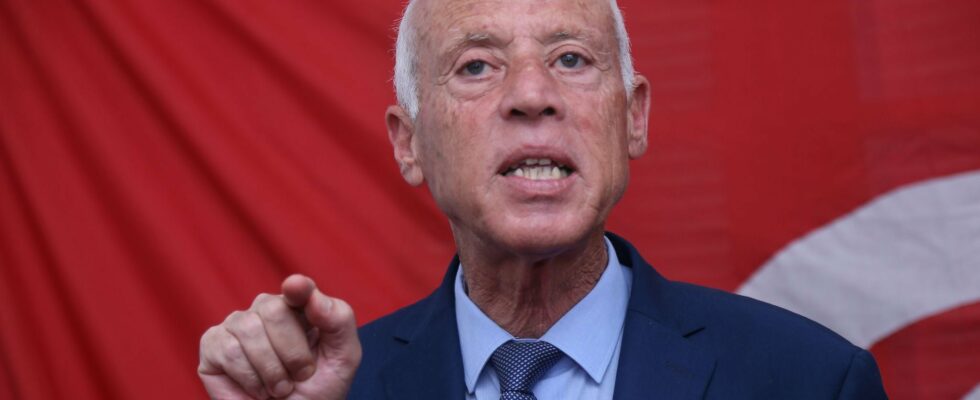A big tear runs down Kaïs Saïed’s left cheek. Drunk with rage, the president has just taken his anger out on the governor of Ben Arous (south of Tunis), at the edge of the Olympic swimming pool in Radès. This Saturday, May 11, 2024, the Tunisian Open Masters, organized by the Tunisian Swimming Federation, is the scene of a psychodrama. The national flag, traditionally raised for this type of event, was covered with a red cloth, in accordance with the sanctions taken by the World Anti-Doping Agency while waiting for the country to integrate international regulations into its legal system. “A heinous crime,” fumes Kaïs Saïed. And here are nine people being prosecuted for “attacking the flag of Tunisia” and “plot against internal security”.
Since his election in October 2019 (with 72.71% of the vote), the president sees cabals everywhere. “Traitors”, “spies” and “shenanigans” of all kinds are threatening the nation, hammering at length the one who granted himself full powers in July 2021 and bastardizing his opponents with all their might. “Kaïs Saïed has established conspiracy as a mode of governance, believes Tunisian essayist Hatem Nafti. The political interest is clear: by designating scapegoats, he absolves himself of any responsibility for his meager record since 2019.” Convenient, in a country weighed down by an endless economic crisis, indebted to the tune of 80% of its GDP and entangled in fruitless negotiations with the International Monetary Fund to obtain a loan.
A “dictatorship of base instincts”
On a daily basis, Tunisians lack everything. Sugar, oil, semolina or milk are often impossible to find on supermarket shelves, despite the “war against speculators” that the head of state claims to be waging, certain that these shortages are a “premeditated act”. Power and water outages? The work of evildoers seeking to sow chaos. In administrations and public companies, heads are rolling. In the winter of 2023, Kaïs Saïed delivers a new enemy to popular vindictiveness: the “hordes of illegal migrants” responsible, according to him, for “violence, crimes and unacceptable acts”. And the president to endorse the far-right thesis of the “great replacement” dear to Eric Zemmour. In Tunis and Sfax, black people are attacked. In the following months, hundreds of migrants were taken to the Libyan border, abandoned under the blazing sun, without water or food, transforming the desert into an open-air cemetery.
“Kaïs Saïed made resentment a policy in a context where Tunisians are looking for culprits after the failure of the post-revolutionary democratic experience [NDLR : à la suite du renversement du dictateur Ben Ali en 2011], analyzes Hamza Meddeb, researcher at the Carnegie Middle East Center. It is a dictatorship of base instincts. The hunt for elites also responds to this logic.” Lawyer and columnist Sonia Dahmani recently paid the price, taken on manu militari by hooded police officers, in front of the France 24 cameras. For having made irony about Saïed’s racist drift, she is accused of having disseminated “false information with the aim of endangering public safety”.
Assassination attempts
“Kaïs Saïed embodies an authoritarianism of identity, like his project: a purely Tunisian, Arab-Muslim Tunisia, where everything that comes from abroad, from the West in particular, is seen with suspicion, observes Vincent Geisser , researcher at the CNRS Consequently, personalities who symbolize international openness, a society where speech is free, are to be punished. Even if it means insinuating vague machinations. The president seems accustomed to this fact. “Even before his election, he said, without proof, that his thesis work had been stolen from him to explain why he never got his doctorate!” recalls Hatem Nafti.
And to continue: “My hypothesis is that the intelligence services nourish in the president the permanent fear of a conspiracy to make themselves indispensable in his eyes.” By raising, for example, the specter of an assassination: at least four attempts would have been foiled according to the presidency. Without any alleged conspirator having been identified.
.
